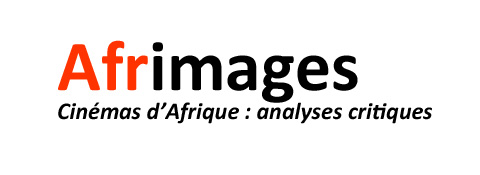(translation of the panel published on the Africultures website)
Hosted by the African Cultural Agency (ACA, Agence Culturelle Africaine) on June 23rd during the African Cinema Pavilion at the virtual film market of the 2020 Cannes festival, this “Zoom” meeting moderated by Olivier Barlet brought together Vincenzo Bugno (director of the World Cinema Foundation, Berlin), Abdul Aziz Cissé permanent secretary of the FOPICA, Senegal), Magalie Armand (CNC, chief of the “coproduction, cooperation and world cinemas” department) and Ousmane Boudaone (Générations Films). The summary will be available hereinafter. The full meeting can be found on youtube.
Some History elements: On a French level, from 1984 to 2010, the production aid for Southern films was ensured by the Fonds Sud, an interministerial mechanism co-financed and co-managed by the Ministry of Foreign Affairs and the Ministry of Culture (delegated to the CNC). This aid was selective and linked: the part allocated by the CNC had to be entirely spent on French companies or technicians, and 20 to 50% of the aid allocated by the Foreign Affairs had to be fully of partly spent in the (eligible) country of the film director. In the past and until 2004, the film section of the Ministry of Foreign Affairs (called Ministry of Cooperation before its integration) discretionarily allocated a « direct aid », which gave them a great deal of power, for which they were blamed. Similarly, the composition of the jury of the Fonds Sud was gradually opened to professionals from the South to respond to the criticism around its ethnocentrism. In 2004, the Fonds Images Afrique was created, and was reserved to professionals based in Africa to supply African television with funds and increase the number of African fiction films in movie theatres supported by the Africa Cinemas’ fund for distribution aid. It therefore didn’t represent a tied aid. As of 2011, this fund has been stopped, as the amounts were supposed to supply the European co-production aid funds (ACPCulture and ACPCultures+ programs) with a French participation. The budget of the cinema section of the Ministry of Foreign Affairs was then limited to supporting training organizations, which put an end that was perceived as abrupt to its historic role. O.B.
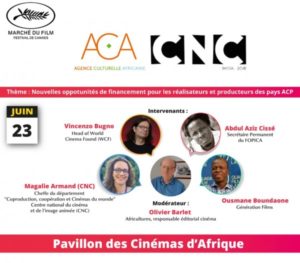
Olivier Barlet: After an in-depth audit about the ACPCultures+ program and a long wait for European funding, the ACP Secretary of the European Union launched a new round of calls for projects. The audit’s recommendation was undoubtedly to entrust existing Funds with the allocation of co-production aids, which have both the necessary skills and teams. Three funds have been selected and are now starting to allocate grants. Two are with us today: DEENTAL-ACP managed by the CNC, and WCF-ACP managed by the World Cinema Fund, an offshoot of the Berlinale. The CLAP-ACP Fund managed by the OIF (Organisation Internationale de la Francophonie) and the FONSIC (Fonds de Soutien à l’Industrie Cinématographique de Côte d’Ivoire) have their own conference at the film market in the pavilion of the French Institute. It is true that, unlike the other two, the CLAP-ACP Fund only targets Francophone films. Now, let’s start with Magalie Armand and DEENTAL-ACP managed by the CNC, which already participates in the Aide aux cinémas du monde and the Fonds Jeune création francophone.
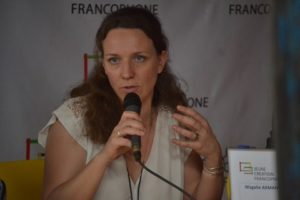 Magalie Armand: The last ACP programs supported projects that had been supported by the Aide aux cinémas du monde. Applying allowed us to complete our existing plans. This restores the balance.
Magalie Armand: The last ACP programs supported projects that had been supported by the Aide aux cinémas du monde. Applying allowed us to complete our existing plans. This restores the balance.
Olivier Barlet: Does this imbalance refer to the Aide aux cinémas du monde that replaced the Fonds Sud, but where the number of selected projects from Africa and especially sub-Saharan Africa is quite low, as it is competed by other continents?
Magalie Armand: Today, l’Aide aux cinémas du monde (ACM), as was the Fonds Sud before, is co-managed with funds from the French Institute and therefore from the Ministry of Foreign Affairs. Statistics show that, at the end of the Fonds Sud, there were lots of Latin American projects, and fewer African projects. We don’t have less projects supported by the Aide aux cinémas du monde than projects supported by the Fonds Sud during its last years. Francophone projects are also eligible for advances on receipt (avances sur recette) at the CNC, and even in several countries, mostly Senegal and the Ivory Coast, projects made in the national language are also eligible.
Olivier Barlet: Yes, this possibility was created in the 1990s under the direction of Dominique Wallon with the co-production agreements giving access to advance on receipt.
Magalie Armand: Yes. We wanted to keep the selective criteria of the Aide aux cinemas du monde within the European project. It was not a question of recreating a Fonds Sud. By giving financial bonuses, the financial contribution of the European Union reinforces the two mechanisms that exist at the CNC: l’Aide aux cinémas du monde and the Jeune création francophone fund. The submission of applications to the Aide aux cinemas du monde is open to all film producers from ACP countries, without a French co-producer, for feature films. But if it is accepted, a French co-producer must be found since the Aide aux cinemas du monde will be granted to the French producer. It is a very selective scheme: 90 projects per session and 9 or 10 of them are supported, for an average amount of 130,000 € per fiction project, and 65,000 € for a documentary. With the European aid, a bonus of around 50 to 100% of this amount can be added, which will be automatically given to the ACP producer. The Jeune Création Francophone fund (JCF) is also open to the audiovisual sector. It has been set up in collaboration with Génération films which administers the Ouaga film lab, along with eleven partners, and promotes south-south co-productions. Bonuses can be accumulated between the three managed funds (DEENTAL, CLAP and WCF). 80% of the whole envelope of each action is intended for financial bonuses in order to be able to contribute pragmatically to production. The rest goes to what is called capacity reinforcement for the training and support of the projects that we manage. On this aspect, we would like to set up (with the two other ACP funds but also with our associated partners from the ACM and the JCF, film departments, professionals and collectives in the African countries targeted) actions that are complementary, coherent and that meet the needs of the projects that we support within the system.
Olivier Barlet: And you have this possibility within the program?
Magalie Armand : Ideally at the end of 2020 if that’s possible . Obviously with the covid, all of the elements that we wanted to implement have been a little bit delayed, but we are working on it and we will resume discussions on what we are implementing at the beginning of the school year. There have already been some cooperation workshops in the Jeune Création Francophone fund framework, one in Mali and another one in Ouagadougou. But as we have certain constraints in terms of agenda, we can’t always manage to respond to requests on a bilateral basis. So the idea would be that with the projects, authors and producers who have been supported, we could organize workshops on a regional level. This support from the ACP countries will also make it possible to take care of people from different countries.
Olivier Barlet: If I understand correctly, if I am a director or a producer for example, I can apply to all three funds since they can be combined?
Magalie Armand: Yes, but it’s three different applications that take you through the selection of each fund. To this day, only the OIF has held commissions in May and June. At the CNC however, our first world cinema commission will be hosted in July, and we will begin allocating the first bonuses to eligible projects, if they are supported. Producers will be able to accumulate bonuses for each program, up to a maximum total amount of 200,000 € per project. If you have Cinémas du monde and have for example 120,000 €, you could get a bonus that reaches 80,000 €. You could therefore have 120,000 € of bonus as well, if your project is also supported by the IOF or the WCF.
Olivier Barlet: So that means that you must make many application files in order to reach the budget necessary for a demanding film.
Magalie Armand: That’s the hard job of a film producer! And we also ask for the files to be in French.
Vincenzo Bugno: On our side, we have two official languages at the WCF, French and English, but also Spanish.
Olivier Barlet: Magalie, how big is your budget for the ACP bonus?
Magalie Armand: We have a budget of 2,400,000 € for the next four years, i.e. 600,000 € per year, plus 150,000 € from the CNC that are added to that, thus an annual total of 750,000 €. 600,000 € will go to the bonuses that will be distributed during the first year, 300,000 € for the Aide aux cinémas du monde and 300,000 € for the Jeune Création Francophone fund. The rest will be used to pay an administrator and for the management of the Deental program, as well as for the reinforcement of capacities, with the workshops that will be set up.
Olivier Barlet: So if I apply to the Deental-ACP fund, how much money can I expect?
Magalie Armand: In our response to the call for offers, we have provided for a bonus amounting from 50 up to 100% of the aid granted in each of the two schemes that we manage. There are four calls per year for the Aide aux cinémas du monde: March, June, September, November. The calendar is available online. For the Jeune Création Francophone fund, we make one call per year, at the beginning of the year, because we receive a lot of projects.
Olivier Barlet: In terms of criteria, how do you articulate things with the audiovisual, series, etc.?
Magalie Armand: We try to have a commission with members that have knowledge and experience in these fields. They are outside professionals. The Jeune Création Francophone fund is also open to short films.
Olivier Barlet: Thank you. Vincenzo Bugno, what was the motivation for the World Cinema Fund to get involved in this process of allocating European funds? And how does it work?
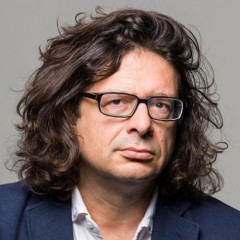 Vincenzo Bugno: The World Cinema Fund (WCF), an organization linked to the Berlinale, has been working since 2004 and has supported around 250 projects, with a support of African cinema as a whole from the beginning, not just French-speaking cinema. In 2016, WCF Africa was founded after a reflection at the Berlinale that same year, with the support of the German Foreign Office. We have thus supported three Sudanese films, an unknown cinematography until then. Within the ACP framework, the Caribbean and the Pacific are also included. The ACP bonus enables us to double or triple the participation of the WCF. The advantage is that for this bonus the normal WCF record is sufficient, which of course has to be retained. The results of the first session will be announced at the beginning of July. All African projects are eligible for the classic WCF and for WCF Africa. If we support a project with an amount of 50,000 €, WCF ACP allows us to reach up to 150,000 €. Two contracts are then signed: one for the classic WCF or WCF Africa and one contract for WCF ACP.
Vincenzo Bugno: The World Cinema Fund (WCF), an organization linked to the Berlinale, has been working since 2004 and has supported around 250 projects, with a support of African cinema as a whole from the beginning, not just French-speaking cinema. In 2016, WCF Africa was founded after a reflection at the Berlinale that same year, with the support of the German Foreign Office. We have thus supported three Sudanese films, an unknown cinematography until then. Within the ACP framework, the Caribbean and the Pacific are also included. The ACP bonus enables us to double or triple the participation of the WCF. The advantage is that for this bonus the normal WCF record is sufficient, which of course has to be retained. The results of the first session will be announced at the beginning of July. All African projects are eligible for the classic WCF and for WCF Africa. If we support a project with an amount of 50,000 €, WCF ACP allows us to reach up to 150,000 €. Two contracts are then signed: one for the classic WCF or WCF Africa and one contract for WCF ACP.
Olivier Barlet: In terms of amounts, what order of magnitude are we in?
Vincenzo Bugno: The maximum we can support for a project within the framework of the WCF is always 60,000 €. With the bonus, this amount can be tripled. It should also be considered that the support of the different entities supported by the ACP Secretary can be accumulated, up to a maximum of 200,000€. Our three organizations should therefore cooperate, talk, and try to understand what kind of projects have been submitted to the different entities.
Olivier Barlet: At the time of ACPCultures+, the European Union’s aid could go up to 400,000 €. The limit now is therefore half of that amount!
Vincenzo Bugno: For us, this is still a big budget. We can also support documentaries, which allows us to do big things.
Olivier Barlet: Magalie said four calls a year, what about you?
Vincenzo Bugno: We have two calls per year, the first in early March and the second in July. The jury meets at the beginning of July and the beginning of November.
Olivier Barlet: And what are your aesthetic criteria, your opinion on the audiovisual industry, etc.?
Vincenzo Bugno: Now more than ever, after the covid crisis, we must try to save cinema. Of course, we can only make a small contribution to support a quality cinema, with an artistic and visual identity, and with a strong content. For Africa, we cannot generalize, as the cases are so different, but we must take in consideration the political and cultural situation, and perhaps help cinema in African countries where cinema doesn’t exist or is facing major difficulties.
Olivier Barlet: Thank you. Abdoul Aziz Cissé, you are the head of the FOPICA, the Senegalese national fund for aid to cinema. We know that the FOPICA is waiting for a budget allocation that would allow it to make a return but perhaps you have some good news, and how do things work with the European funds?
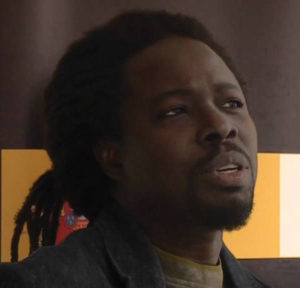 Abdul Aziz Cissé: At the beginning of 2020, the FOPICA funded projects that were already selected: about ten projects were financed. A first part of the funding was given to us by the Finance Department. We distributed this money to the projects that had already started but were encountering difficulties to continue and finalize them. Three or four of them are now finished. Compared to the crisis we have been going through since 2017, this is a breath of fresh air. The funds given by the ACP Secretary are absolutely beneficial: they enabled us to make a real progress on the making of the projects. The amounts that national funds such as the FOPICA have are not very significant. Since 2018, 1 billion CFAF has been announced, but it is hard to make it happen. Overall, that corresponds to the budget for one or two feature films. This is the reason why, from the beginning, the management committee chose to assist only a limited percentage of the projects submitted with its budget, and I think that is how all the other funds work. This initial investment by Senegal makes it easier for them to get the usual funding from the other funds. This ensures that the work has been done beforehand in terms of structuring the projects, which cannot be neglected.
Abdul Aziz Cissé: At the beginning of 2020, the FOPICA funded projects that were already selected: about ten projects were financed. A first part of the funding was given to us by the Finance Department. We distributed this money to the projects that had already started but were encountering difficulties to continue and finalize them. Three or four of them are now finished. Compared to the crisis we have been going through since 2017, this is a breath of fresh air. The funds given by the ACP Secretary are absolutely beneficial: they enabled us to make a real progress on the making of the projects. The amounts that national funds such as the FOPICA have are not very significant. Since 2018, 1 billion CFAF has been announced, but it is hard to make it happen. Overall, that corresponds to the budget for one or two feature films. This is the reason why, from the beginning, the management committee chose to assist only a limited percentage of the projects submitted with its budget, and I think that is how all the other funds work. This initial investment by Senegal makes it easier for them to get the usual funding from the other funds. This ensures that the work has been done beforehand in terms of structuring the projects, which cannot be neglected.
Olivier Barlet: So a sort of business card?
Abdul Aziz Cissé: Absolutely. The FOPICA is the 5th Fund created by Senegal, but there was a gap of more than 10 years before the FOPICA was created, during which filmmakers expressed their need for a state support. Not simply to give them a Senegalese nationality, but also in terms of deposit and for a business card.
Olivier Barlet: So this is an exemplary fund for other countries, which in addition opens a better entry point for other forms of funding. A model to follow!
Abdul Aziz Cissé: Senegal does not simply limit itself to managing its fund and its projects. We negotiate bilateral cooperation agreements with neighboring countries. The Ivory Coast has already signed one, Burkina Faso and Tunisia as well. It is in the process of happening with Mali, for example. The idea is to unite our resources and carry out more ambitious projects together. This will create a knock-on effect on other countries to propel things on their level. It is all the more necessary for filmmakers, producers and technicians, there are no borders. This sharing of resources makes it possible to move forward and grow together to be competitive with other countries.
Olivier Barlet: This is even more important because the FOPICA is not just a fund for production: it also concerns training, distribution, etc. In addition, the pan-African dimension is important.
Abdul Aziz Cissé: Indeed, each part is important, and we focus on structuring. The FOPICA does not seek to support films that, in the best case scenario, will be presented in festivals; we are in a dynamic of industrial structuring.
Olivier Barlet: Thank you. Ousmane Boundaone, you are the head Génération Films and manage the Ouaga film lab: how are producers and writing labs linked to these ACP funds?
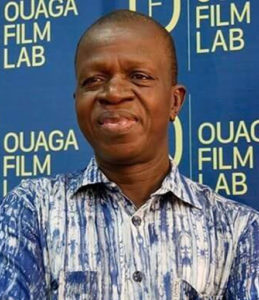 Ousmane Boundaone: Génération Films manages the Jeune Création Francophone fund, which is part of the Deental program. Since 2016, the Ouaga film lab has been interested in developing projects in the film and audiovisual sectors by creating director-producer pairs to benefit from the workshops and mentoring, but also networking. The pitch workshop is for us the key asset of this platform. It’s a way of boosting the integration of international platforms, writing labs and residencies, or of benefitting from training for producers who sorely lack that, in terms of co-productions and international financing. Since 2017, we have been developing the « Ouaga producer lab » workshop for this purpose. The FOPICA enables young Senegalese professionals to join the two platforms, the Ouaga film lab and the Ouaga producer lab. Now we can see the progression of their expertise.
Ousmane Boundaone: Génération Films manages the Jeune Création Francophone fund, which is part of the Deental program. Since 2016, the Ouaga film lab has been interested in developing projects in the film and audiovisual sectors by creating director-producer pairs to benefit from the workshops and mentoring, but also networking. The pitch workshop is for us the key asset of this platform. It’s a way of boosting the integration of international platforms, writing labs and residencies, or of benefitting from training for producers who sorely lack that, in terms of co-productions and international financing. Since 2017, we have been developing the « Ouaga producer lab » workshop for this purpose. The FOPICA enables young Senegalese professionals to join the two platforms, the Ouaga film lab and the Ouaga producer lab. Now we can see the progression of their expertise.
Debate with the « room » (with more than 80 people connected)
Fatou Kiné Sène (Head of the African Federation of Film Critics): In terms of reinforcement of capacities, are the workshops that will be funded defined in advance, or can they be proposed, for example one on critique?
Magalie Armand: We would like to meet the needs of the authors and producers who will be supported, but we are still in the defining phase. The call for projects is therefore not defined yet.
Olivier Barlet: Vincenzo, will you also have a program for the reinforcement of capacities?
Vincenzo Bugno: Our budget is much smaller than that of the CNC: about 1 million euros for the entirety of the ACP program, so 200,000 € each year for the production aid. Therefore, we don’t really have the possibility of developing a program of capacity reinforcement.
Denise Richert (European Commission): Regarding the question of the higher amount of subsidies in our previous programs, I would like to clarify why we have set up this new mechanism. It was decided upon the request of people from the field who were speaking out against the discontinuity of the aid. The individual grants were bigger, but reformulating a proposal the following year was impossible as it would take five years to have a new call issued. In addition, the three Funds will now provide support depending on the calls they will launch. This mechanism is intended to boost the field: we have asked each of our three beneficiaries to launch at least one call per year and, and as Magalie and Vincenzo pointed out, they will launch more in the future. We already have 10 projects selected by the CLAP-ACP Fund of the OIF and the FONSIC. ACPCulture+, which was maintained for 5 years, has funded only 18 projects.
Olivier Barlet: Considering how European countries are devoting huge sums of money to resolving the covid-19 crisis, can we hope that this mechanism will have a follow-up?
Denise Richert: We are trying to have this sustainability but also to support structures that will become viable. This is our priority. We have been subsidizing ACP programs since 2000, with results that are extremely satisfactory. Networks are being created and partnerships are just waiting to continue working from one program to the next. Capacity reinforcement is essential to ensure that films don’t remain in the drawers. This is why we support co-productions and require partnerships from several EU-ACP entities. Another call that is currently ongoing also subsidizes the quality of creation, an improved access to the market, tools for young people to launch start-ups, etc., all to enable young people to build themselves up and make a living out of their work. If the quality is there, international recognition must follow. All the information is on acp-ue-culture.eu, and a new platform has also just been created: culturexchange.eu.
Frédéric Violeau (program officer, Docmonde / Africadoc): The breakup that occurred caused a lot of difficulties. Will the next program be able to follow-up?
Denise Richert: The current program amounts to 40 million euros with 3 calls: the first which is of 6 million euros that we are currently talking about, a second one of 26 million euros currently underway covering all sectors linked to culture, and another one of 4 million euros that will be dedicated to co-productions. We are waiting for the results of this first call so that we can work on the new guidelines by the end of 2020. Regardless, the contracts must be signed by 2022. The new call of 4 million euros for co-productions will thus be launched in 2021.
Olivier Barlet: How does the ongoing fund of 26 million euros work?
Denise Richert: It involves intermediary organizations in six regions: Southern, East, West and Central Africa, the Pacific and the Caribbean. These organizations will launch calls for proposals every year. They will focus on four aspects: quality of creation, access to the market, improved financing and image education. All calls will be relayed on acp-ue-culture.eu.
Magalie Armand: Just a clarification: the Jeune création Francophone fund also concerns part of the Indian Ocean and Haiti.
Alex Moussa Sawadogo (Ouaga Film Lab): Cape Verde also joined the group this year with two projects for the Jeune création Francophone fund.
Fatou Kiné Sène: Could Abdoul Aziz Cissé give some details about the projects that are waiting for the results of the call for applications launched by the FOPICA?
Abdoul Aziz Cissé: The President had announced that from 2018 on, the fund would be doubled, thus reaching 2 billion FCFA. Still to this day, it remains difficult to mobilize them. The amount actually allocated to the FOPICA has been modified. Hence the importance of stabilizing the fund. A call has been launched and the selective work has been done for a very long time. Unfortunately, the amounts allocated to us have been used exclusively to strengthen the projects already selected beforehand. Those are the reasons behind the delay. The envelope that was received in the beginning of 2020 was used to support about ten projects, which had been submitted during the last call for projects, to enable the projects that had been started to continue to develop and be finalized.
Jérémie Palanque (Woooz Pictures, France): We are already supporting a project in Congo. How do you find authors or projects looking for European co-producers in the ACP area?
Ousmane Boundaone: Ouaga film lab is a hub that helps identify the talents that exist on our continent. For now, we are open to the 15 West African English, French and Portuguese speaking countries, including Cape Verde and Guinea Bissau, as well as 8 countries in Central Africa and the Great Lakes. You can contact us through our website ouagafilmlab.net.
Alex Moussa Sawadogo: And in addition to strengthening the writing process, the Ouaga film lab encourages meetings and thus south-south co-productions that can submit their project to the Jeune création Francophone fund or to the World Cinema Fund.
Yacouba Kébé (Malian film producer, rainbow group): Concerning the national support structures for cinema, does the ACP program provide a structuring assistance? In 2018, Mali has adopted a law for a support fund for the film industry. It was supposed to be endowed with 6 billion FCFA over 3 years, but nothing has happened yet. Only international funds therefore remain.
Ousmane Boundaone: Last December, I took part in the meeting for the launching of this fund in Mali. It was to supposed take into account the entire chain, from creation to production, by 2020. In the meantime, we need to turn to international funds and south-south co-productions: there are Mali-Senegal co-production agreements, for example.
Sol de Carvalho (Mozambican film director): I think the new ACP program marks a radical change: in the past, we could have a direct contact with African producers, but now we must go through intermediary organizations. Furthermore, Africa is divided into four regions in the program « Support for the cultural and creative sectors in ACP countries » (Soutien aux secteurs de la culture et de la creation dans les pay ACP), and the responsibilities are transferred to regional bodies. This hardens the difficulty to make a film for producers. But hey, we must eat with the food we have been given! Now we just need to see what will be really done for the Portuguese-speaking parts Africa. I have heard that you can submit a file to the WCF in Spanish, but there is only one Spanish-speaking country in Africa, while five countries speak Portuguese. Making a file in Portuguese used to be possible. But it is not the case anymore. So the producer has to finance the whole translation of the file. In addition, you have to jump from one program to another to accumulate the funds, and in the end, you end up with less money. Let’s not forget that at the same time, Netflix has started buying programs and financing African production…
Vincenzo Bugno: We’re very much aware of the situation of Portuguese-speaking Africa, and we’re easy to get in touch with. Do not hesitate to contact us. It is a very important cultural and political priority for us.
Magalie Armand: The Aide aux cinémas du monde is open to filmmakers from all over the world, as long as they have a co-production with a film producer established in France, if the project is supported. The Portuguese cinema and audiovisual Institute has a fund supporting Portuguese-speaking African countries.
Denise Richert: Lusophone African countries are eligible for ACP calls for co-production projects. As for the call « Support for the cultural and creative sectors in ACP countries », it concerns all cultural industries and works the same way.
Marcelin Bossou (Togolese film director and producer): Does the FOPICA intervene on projects coming from countries other than Senegal, and what are the mechanisms of south-south production collaborations?
Alex Moussa Sawadogo: South-south co-productions do exist and that is precisely what we encourage at the Ouaga film lab. In addition to the training that we give to producers, we invite other producers from the continent and from Europe to encourage co-productions, within the limits of our means. We therefore work a lot with Senegal and the FOPICA. We must start by reflecting and working together on co-productions, here in the South.
Ousmane Boundaone: Aziz spoke of bilateral co-production agreements, but unfortunately, between African countries, there are still no funds that could promote south-south co-productions on the continent.
Abdul Aziz Cissé: The FOPICA is a national fund, but it doesn’t finance only Senegalese projects, especially with the co-production agreements that we sign, but also with the SENTOO program which allows us to support authors of different nationalities in the development of their projects.
Hicham Fallah: Indeed, in the SENTOO program initiated by the film centers of six African countries, there are co-production agreements between our countries, such as between Senegal and Morocco for example, and technically nothing can prevent a Senegalese filmmaker from submitting a project to the Moroccan aid fund with a Moroccan co-producer. But although producers from different countries can work together to support a project, it is true that the technical and legal aspects have yet to be sorted out. The concept of co-production is not assimilated by the national funds already existing on our continent yet. We will all have to work together and push through to convince our political leaders on the feasibility and the super-positive side of our regional co-productions.
Olivier Barlet: Thank you for this intervention, which will be the final word, but nonetheless important. Thank you to all the participants and to our contributors for this enlightenment.
Special thanks to Amal El Moutaouakil for her help with the transcription and translation into English (French version on the Africultures website)
